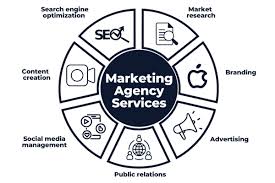Feast Your Eyes on the Art of Food PR: Crafting Appetizing Brand Stories
The Power of Food PR: Building Appetizing Brands
In today’s competitive culinary landscape, food Public Relations (PR) plays a crucial role in shaping the image and reputation of food brands. Effective food PR goes beyond just promoting products; it involves creating engaging narratives, building relationships with consumers, and establishing credibility in the industry.
Food PR professionals work tirelessly to craft compelling stories that resonate with audiences. From highlighting the farm-to-table journey of ingredients to showcasing the creativity behind menu creations, every aspect of a brand’s story is carefully curated to evoke emotions and connect with consumers on a deeper level.
One of the key aspects of food PR is managing reputation and crisis communication. In an age where social media can make or break a brand in an instant, food PR experts are trained to handle negative publicity effectively, protect brand integrity, and turn challenges into opportunities for growth.
Moreover, food PR is essential for building partnerships and collaborations within the industry. Whether it’s working with influencers to reach new audiences or teaming up with other food brands for co-promotions, strategic alliances can help elevate a brand’s visibility and credibility.
Food PR also plays a vital role in driving consumer engagement through various channels such as social media, events, and traditional media. By creating interactive campaigns, organising tastings or participating in food festivals, brands can foster loyalty among their target audience and stay top-of-mind in a crowded market.
Ultimately, food PR is about storytelling – sharing the passion and dedication that goes into creating delicious experiences for consumers. By leveraging the power of communication and relationship-building, food brands can not only attract new customers but also foster long-lasting connections that keep them coming back for more.
Top 5 Advantages of Food PR for Brand Success
- Enhances brand visibility and recognition in a competitive market.
- Builds credibility and trust among consumers through strategic storytelling.
- Drives consumer engagement and loyalty through interactive campaigns.
- Helps manage reputation effectively, especially during crisis situations.
- Facilitates partnerships and collaborations to expand reach and influence.
Challenges and Pitfalls in Food PR: Navigating a Competitive Industry
- 1. High competition in the food industry makes it challenging to stand out and capture consumers’ attention through food PR.
- 2. Negative reviews or publicity can spread quickly on social media, damaging a brand’s reputation despite PR efforts.
- 3. Managing food PR crises requires swift and strategic responses to mitigate potential damage to the brand’s image.
- 4. Balancing authenticity with promotional messaging in food PR campaigns can be tricky, risking consumer trust if not executed well.
- 5. The fast-paced nature of the food industry demands constant adaptation and innovation in PR strategies to stay relevant and competitive.
- 6. Securing media coverage for food brands may be difficult due to saturated media channels and changing preferences of journalists.
Enhances brand visibility and recognition in a competitive market.
Food PR plays a crucial role in enhancing brand visibility and recognition in a competitive market. By strategically communicating a brand’s unique story, values, and offerings through various channels, such as media placements, influencer partnerships, and engaging events, food PR helps brands stand out amidst fierce competition. Increased visibility leads to greater consumer awareness and recognition, ultimately positioning the brand as a top choice in the minds of consumers when making purchasing decisions. This heightened visibility not only attracts new customers but also fosters loyalty among existing ones, driving long-term success and growth for food brands in a crowded marketplace.
Builds credibility and trust among consumers through strategic storytelling.
Food PR excels in building credibility and trust among consumers through strategic storytelling. By crafting compelling narratives that highlight a brand’s values, sourcing practices, and commitment to quality, food PR professionals create a sense of transparency and authenticity that resonates with audiences. Through these stories, consumers gain insight into the brand’s ethos and are more likely to develop a positive perception of the company. This strategic approach not only enhances credibility but also fosters trust, ultimately leading to stronger relationships between the brand and its customers.
Drives consumer engagement and loyalty through interactive campaigns.
Food PR excels in driving consumer engagement and loyalty through interactive campaigns that captivate audiences and create lasting connections. By leveraging creative strategies such as social media contests, experiential events, and tastings, food brands can actively involve consumers in their brand story and product experience. These interactive campaigns not only spark interest and excitement but also foster a sense of community and loyalty among customers, encouraging repeat purchases and positive word-of-mouth recommendations.
Helps manage reputation effectively, especially during crisis situations.
Food PR plays a crucial role in helping businesses manage their reputation effectively, particularly during crisis situations. Skilled food PR professionals are adept at swiftly responding to negative publicity, addressing concerns transparently, and mitigating damage to a brand’s image. By implementing strategic communication tactics and crisis management strategies, food PR can help companies navigate challenging circumstances with integrity and professionalism, ultimately safeguarding their reputation and maintaining consumer trust.
Facilitates partnerships and collaborations to expand reach and influence.
Food PR plays a pivotal role in facilitating partnerships and collaborations within the food industry, allowing brands to expand their reach and influence. By forging strategic alliances with influencers, other food brands, or industry experts, food PR professionals can tap into new audiences, amplify their brand message, and enhance their credibility. These partnerships not only help in reaching a wider consumer base but also enable brands to leverage the expertise and resources of their collaborators to create innovative campaigns and experiences that resonate with consumers on a deeper level. Through effective collaboration, food PR opens up opportunities for brands to strengthen their position in the market and establish themselves as key players in the culinary world.
1. High competition in the food industry makes it challenging to stand out and capture consumers’ attention through food PR.
In the competitive landscape of the food industry, one significant challenge of food PR is the high level of competition, which makes it increasingly difficult for brands to differentiate themselves and capture consumers’ attention effectively. With numerous food brands vying for visibility and engagement, standing out in a crowded market requires innovative strategies and compelling storytelling to break through the noise and resonate with target audiences. The constant battle for consumer attention underscores the importance of strategic planning and creativity in food PR campaigns to overcome this hurdle and carve out a distinctive brand identity that leaves a lasting impression on consumers.
2. Negative reviews or publicity can spread quickly on social media, damaging a brand’s reputation despite PR efforts.
In the realm of food PR, a significant drawback is the rapid spread of negative reviews or publicity on social media platforms. Despite diligent PR efforts, a single disparaging comment or unfavourable post can swiftly gain traction online, potentially tarnishing a brand’s reputation. The instantaneous nature of social media amplifies the impact of such criticisms, making it challenging for PR professionals to mitigate the damage effectively. This con highlights the importance of proactive reputation management and crisis communication strategies in the food industry to address and counteract negative feedback before it escalates.
3. Managing food PR crises requires swift and strategic responses to mitigate potential damage to the brand’s image.
One significant challenge of food PR is the necessity to manage crises swiftly and strategically to prevent harm to the brand’s reputation. In the fast-paced world of social media and instant news dissemination, any negative incident or controversy can quickly escalate and tarnish a brand’s image. Food PR professionals must be prepared to address such situations promptly, with carefully planned responses that aim to minimise the impact on consumer trust and loyalty. Failure to handle crises effectively can lead to long-term damage to a brand’s reputation and credibility in the eyes of consumers.
4. Balancing authenticity with promotional messaging in food PR campaigns can be tricky, risking consumer trust if not executed well.
Balancing authenticity with promotional messaging in food PR campaigns can be a challenging aspect that poses a significant risk to consumer trust if not handled carefully. When trying to convey a brand’s message while maintaining transparency and credibility, there is a fine line that must be walked. If promotional messaging comes across as insincere or misleading, consumers may perceive the brand as inauthentic, leading to a loss of trust and loyalty. It is crucial for food PR professionals to navigate this delicate balance effectively to ensure that their campaigns resonate with audiences in an honest and genuine manner.
5. The fast-paced nature of the food industry demands constant adaptation and innovation in PR strategies to stay relevant and competitive.
In the realm of food PR, one notable challenge is the relentless pace of the food industry, which necessitates continual adaptation and innovation in PR strategies to remain pertinent and competitive. The ever-evolving consumer preferences, market trends, and technological advancements require food PR professionals to stay agile and proactive in their approach. Keeping up with these rapid changes demands a high level of flexibility and creativity to ensure that brands can effectively engage with their audience and differentiate themselves in a crowded marketplace. Failure to adapt swiftly to industry shifts could result in missed opportunities and diminished brand visibility, highlighting the critical importance of staying ahead of the curve in food PR practices.
6. Securing media coverage for food brands may be difficult due to saturated media channels and changing preferences of journalists.
Securing media coverage for food brands can pose a significant challenge in today’s landscape due to the saturation of media channels and the evolving preferences of journalists. With an abundance of food-related content competing for attention, it can be increasingly difficult for brands to break through the noise and secure valuable coverage. Journalists’ shifting interests and priorities further complicate the process, making it crucial for food PR professionals to stay agile and adapt their strategies to align with the ever-changing media landscape. Despite these obstacles, innovative approaches and strategic planning can help food brands navigate these challenges and find opportunities to effectively communicate their unique stories and offerings to their target audiences.












